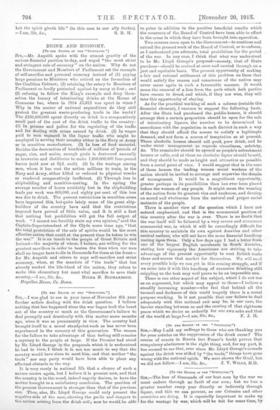[To THE EDITOR OP THE "SPECTATOR.") SIR, —I was glad
to see in your issue of November 6th your further article dealing with the drink question. I believe nothing that has happened since the war began took the heart out of the country so much as the Government's failure to deal promptly and drastically with this matter some months ago, when it was so prominently in view. The country had brought itself to a moral standpoint such as has never been experienced in the memory of this generation. The moon for the failure to take advantage of that feeling still remains a myStery to the people at large. If the Premier had stood by Mr. Lloyd George in the proposals which it is understood he had in view. I think it is not too much to say that the country would have risen to meet him, and that neither " the trade" nor any party would have been able to place any effectual obstacle in the way.
It is very rarely in national life that a chance of such a nature occurs again, but I believe it is present now, and that the country is in the mood, indeed eagerly desires, to have the matter brought to a satisfactory conclusion. The position of the present Government is stronger than that of the previous one. Then, also, Mr. Lloyd George could only present the negative side of the case, showing the perils and dangers to the nation arising from the drink evil; now he would.be able to point in addition to the positive beneficial results which the measures of the Board of Control have been able to effect in the areas in which they have been brought into operation.
Two courses seem open to the Government—to continue and extend the present work of the Board of Control, or to enforce, as I understand you advocate, total prohibition for the period of the war. In any case, I think that what was understood to be Mr. Lloyd George's proposal—namely, that of State purchase—should be revived at once and carried through on a just and equitable basis. The present opportunity of making a fair and rational settlement of this problem on lines that would satisfy the reason and conscience of the nation may never occur again in such a favourable manner. It would mean the removal of a lion from the path which both parties have reason to dread, and which, if they are wise, they will take this opportunity of slaying.
As for the practical working of such a scheme (outside the financial element), I venture to suggest the following basis. After the State had purchased the public-houses, it should arrange that a certain proportion should be open for the sale of intoxicating liquors, the number to be determined in accordance with the population in each district in such a way that they should afford the means to satisfy a legitimate demand, and not form a source of temptation as at present. These alcoholic houses should sell good, pure drink, and be under strict management as regards cleanliness, sobriety, &c. The remainder should bo opened as people's refreshment houses or cafes, and at these no alcoholic liquor should be sold, and they should be made as bright and attractive as possible from a social point of view. I would suggest that in the case of these houses the leading women social workers of the nation should be invited to arrange and supervise the details of management. It would be a magnificent opportunity, greater perhaps in its possibilities than has ever been placed before the women of any people. It might mean the weaning of the nation from its greatest vice and weakness, and develop on sound and wholesome lines the natural and proper social instincts of the people.
There is another view of the question which I have not noticed emphasized, and that is the commercial position of this country after the war is over. There in no doubt that the war itself will be followed by a very severe and strenuous commercial war, in which it will be exceedingly difficult for this country to maintain its own against America and other neutral nations, who will not have the same financial handicap resting upon them. Only a few days ago I had a letter front one of the largest English merchants in South America, stating how vigorously the Americans are striving to take advantage of the present opportunity to oust British trade there and secure that market for themselves. We will need every possible help we can get in this coming struggle, and if we enter into it with this handicap of excessive drinking still crippling us the task may well prove to be an impossible one There is one other aspect of the subject, which I do not use as an argument, but which may appeal to those—I believe a steadily increasing number—who feel that behind all the turmoil and darkness of this world tragedy there is a moral purpose working. Is it not possible that our failure to deal adequately with this national evil may be, in our case, the barrier standing between us and the coming of that righteous peace which we desire so ardently for our own sake and that
of the world at large P—I am, Sir, &c., F, J. IT.














































 Previous page
Previous page